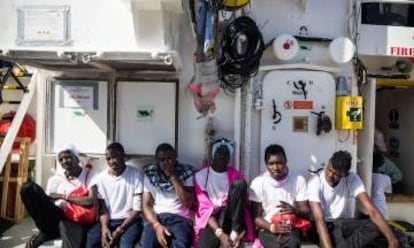With no EU policy forthcoming, Spain gets tougher on immigration
“This is not a retreat. We are under enormous migratory pressure,” says an Interior Ministry source

In June of last year, a newly formed government in Spain sought to give the world a lesson by welcoming the Aquarius, a humanitarian rescue ship with 629 migrants aboard that had been refused entry by Italy and Malta.
But the lack of a common European immigration policy and record migrant arrivals are causing Spanish authorities to review their own rules.
Very little information is emerging about the efforts to send migrants back to Morocco
Humanitarian rescue ships are now being denied departure permits, while the government keeps pressuring Brussels to listen to demands by Morocco, which is the main departure point for undocumented migrants going to Spain.
The goal is to avoid pressure from mass arrivals at a time when immigration has become a relevant issue on an election year. Spain will hold local, regional and European elections in May. In December, the ruling Socialist Party (PSOE) sustained a stinging defeat in the southern region of Andalusia, where a far-right party named Vox made inroads on the promise to crack down on illegal immigration.
Data from Frontex, the European border and Coast Guard agency, shows nearly 57,000 migrants arrived on southern Spanish shores in 2018, twice the figure in Italy and nearly the same to have arrived in Greece. The Spanish Interior Ministry places that figure at upward of 64,000.
And with Italy keeping up its closed-port policy, Spain has decided that some kind of action is required.
You can’t say that we haven’t shown goodwill since the Aquarius case
Foreign Minister Josep Borrell
“This is not a retreat,” said a source at Spain’s Interior Ministry. “We are under enormous migratory pressure, and the rules are not being applied in the Central Mediterranean. We need a lasting solution for everyone.”
European member states have been trying to hammer out a temporary solution that will prevent critical situations like the ones produced by Italy and Malta’s reiterated refusals to take in humanitarian ships. Interior ministers are scheduled to meet in Romania in early February to discuss the matter further, but there is little hope that an agreement will be reached that makes everyone happy.
In the meantime, Spain has dropped the open-arms policy that enabled several rescue ships to dock in Spanish ports in recent months. Instead, humanitarian vessels are being denied departure permits, presumably because they are failing to meet safety standards. The reality is that authorities do not wish to find themselves anew in a situation where they are forced to take in a ship filled with migrants that no other European country wants.

In early January, the Spanish executive for the first time refused to participate in a migrant-sharing scheme organized by Malta that affected 49 people out at sea. “You can’t say that we haven’t shown goodwill since the Aquarius case,” said Foreign Minister Josep Borrell.
There are other little telltale signs that the Socialist government does not want right-wing parties to use immigration as a weapon against the executive. Salvamento Marítimo, Spain’s sea-rescue service, has stopped providing information on its Twitter account about the migrant boats it assists on a daily basis.
And very little information is emerging about the efforts to send migrants back to Morocco, the departure point for most arrivals: more than 3,000 people in the first two weeks of January, almost three times as many as the same period in 2018, according to official Spanish figures.
Officials from Madrid and Rabat will meet again to discuss the matter. Madrid wants more oversight and speedier deportations, while Rabat wants more money from Brussels to fund the effort.
English version by Susana Urra.
Tu suscripción se está usando en otro dispositivo
¿Quieres añadir otro usuario a tu suscripción?
Si continúas leyendo en este dispositivo, no se podrá leer en el otro.
FlechaTu suscripción se está usando en otro dispositivo y solo puedes acceder a EL PAÍS desde un dispositivo a la vez.
Si quieres compartir tu cuenta, cambia tu suscripción a la modalidad Premium, así podrás añadir otro usuario. Cada uno accederá con su propia cuenta de email, lo que os permitirá personalizar vuestra experiencia en EL PAÍS.
¿Tienes una suscripción de empresa? Accede aquí para contratar más cuentas.
En el caso de no saber quién está usando tu cuenta, te recomendamos cambiar tu contraseña aquí.
Si decides continuar compartiendo tu cuenta, este mensaje se mostrará en tu dispositivo y en el de la otra persona que está usando tu cuenta de forma indefinida, afectando a tu experiencia de lectura. Puedes consultar aquí los términos y condiciones de la suscripción digital.









































